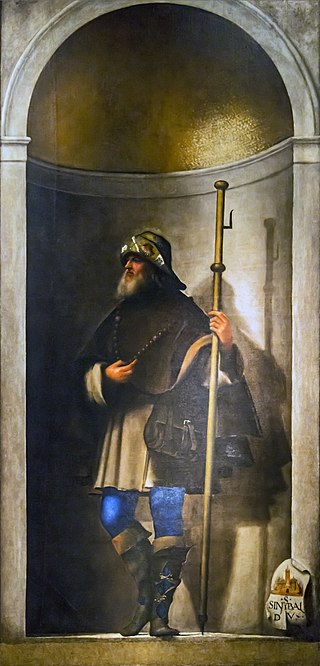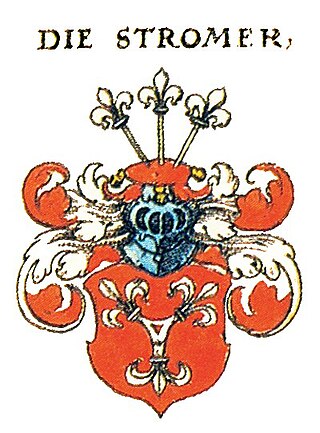A Reichswald or imperial forest was an area of historic woodland which existed in the Holy Roman Empire and was under direct imperial control, protection and usage.
Reichswald may refer to:

Franconia is a region of Germany, characterised by its culture and Franconian dialect.

Nuremberg is the second-largest city of the German state of Bavaria after its capital Munich, and its 518,370 (2019) inhabitants make it the 14th-largest city in Germany. On the Pegnitz River and the Rhine–Main–Danube Canal, it lies in the Bavarian administrative region of Middle Franconia, and is the largest city and the unofficial capital of Franconia. Nuremberg forms with the neighbouring cities of Fürth, Erlangen and Schwabach a continuous conurbation with a total population of 800,376 (2019), which is the heart of the urban area region with around 1.4 million inhabitants, while the larger Nuremberg Metropolitan Region has approximately 3.6 million inhabitants. The city lies about 170 kilometres (110 mi) north of Munich. It is the largest city in the East Franconian dialect area.

The Franconian Circle was an Imperial Circle established in 1500 in the centre of the Holy Roman Empire. It comprised the eastern part of the former Franconian stem duchy—roughly corresponding with the present-day Bavarian Regierungsbezirke of Upper, Middle and Lower Franconia—while western Rhenish Franconia belonged to the Upper Rhenish Circle. The title of a "Duke of Franconia" was claimed by the Würzburg bishops.

Operation Veritable was the northern part of an Allied pincer movement that took place between 8 February and 11 March 1945 during the final stages of the Second World War. The operation was conducted by Field Marshal Bernard Montgomery's Anglo-Canadian 21st Army Group, primarily consisting of the First Canadian Army under Lieutenant-General Harry Crerar and the British XXX Corps under Lieutenant-general Brian Horrocks.
Nuremberg is a city in Germany.
Nürnberger may refer to:

Heroldsberg is a municipality in the district of Erlangen-Höchstadt, in Bavaria, Germany. It is located eleven kilometers north-east from the city of Nuremberg and 23 kilometers east from Erlangen and is the headquarters of Schwan-Stabilo.
Langwasser is a part (Stadtteil) of Nuremberg in the southeastern area of the city. It was developed as a prototype of the satellite town concept in the 1960s and is primarily a suburban residential area. The name Langwasser, comes from a small stream bordering the area on its eastern edge.

The village of Tennenlohe, is a local subdistrict and a statistical district in the southeast part of the independent city of Erlangen in the Bavarian administrative district of Middle Franconia. Until 1972, when it was incorporated, Tennenlohe was an independent municipality in the Erlangen county. The statistical district 52, which covers a large part of the Tennenlohe district, has about 4,400 inhabitants.

Sebaldus was an Anglo-Saxon missionary to Germany in the 9th or 10th century. He settled down as a hermit in the Reichswald near Nuremberg, of which city he is the patron saint. According to legend, Sebaldus was a hermit and a missionary.

Honey hunting or honey harvesting is the gathering of honey from wild bee colonies and is one of the most ancient human activities and is still practiced by aboriginal societies in parts of Africa, Asia, Australia and South America. Some of the earliest evidence of gathering honey from wild colonies is from rock painting, dating to around 8,000 BC. In the Middle Ages in Europe, the gathering of honey from wild or semi-wild bee colonies was carried out on a commercial scale.

Nuremberg Zoo is a zoo located in the Nuremberg Reichswald, southeast of Nuremberg, Germany. With an area of 67 hectares, approximately 300 animal species are kept by the zoo.

The Imperial City of Nuremberg was a free imperial city — independent city-state — within the Holy Roman Empire. After Nuremberg gained piecemeal independence from the Burgraviate of Nuremberg in the High Middle Ages and considerable territory from Bavaria in the Landshut War of Succession, it grew to become one of the largest and most important Imperial cities, the 'unofficial capital' of the Empire, particularly because numerous Imperial Diets and courts met at Nuremberg Castle between 1211 and 1543. Because of the many Diets of Nuremberg, Nuremberg became an important routine place of the administration of the Empire during this time. The Golden Bull of 1356, issued by Emperor Charles IV, named Nuremberg as the city where newly elected kings of Germany must hold their first Imperial Diet, making Nuremberg one of the three highest cities of the Empire.

The Klever Reichswald is an Imperial forest in North Rhine-Westphalia (Germany) between the rivers Rhine and Meuse at the German–Dutch border. The forest is located in the municipal territory of Kleve, Goch, Kranenburg and Bedburg-Hau. It is the largest coherent wooded area of the lower Rhine and the largest coherent public state forest of North Rhine-Westphalia with an area of 51 km2.
Germany and Germanic lands have been invaded by foreign powers several times. Invasion of Germany may refer to the following:
The Nuremberg–Roth railway is a 25.5-kilometre (15.8 mi) long main line railway in the German state of Bavaria, running from Nuremberg via Schwabach to Roth. It was built parallel with the Nuremberg–Augsburg railway during the first construction phase of the Nuremberg S-Bahn and opened on 9 June 2001.
The Nuremberg–Feucht railway is a 12.5-kilometre (7.8 mi)-long main-line railway in the German state of Bavaria, running from Nuremberg Hauptbahnhof to Feucht. It was built parallel with the Nuremberg–Regensburg railway during the first construction phase of the Nuremberg S-Bahn and opened on 21 November 1992.

The Feucht–Altdorf railway is a single-track main-line railway running through Middle Franconia in the German state of Bavaria. It is the extension of the Nuremberg–Feucht railway, which ends at Feucht station, and runs from there to the east through the Lorenzer Reichswald to Altdorf.

The Nuremberg Ring Railway is the ring railway for freight that runs at a distance of three to four kilometres from the center of Nuremberg in the German state of Bavaria.

The Stromer von Reichenbach are one of the oldest patrician families of the Imperial City of Nuremberg, first mentioned in a document in 1254. The Stromers were represented in the Inner Council from the beginning of the tradition in 1318, with longer interruptions in the 16th and 17th centuries, until the end of the Imperial City period in 1806, and according to the Dance Statute they belonged to the twenty old councilable families.